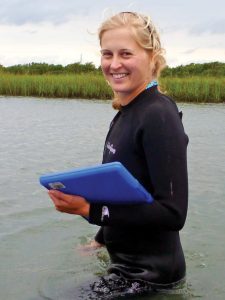
Both state and federal policymakers and managers are using doctoral student Rachel Gittman’s dissertation research as they address coastal management challenges.
Gittman is one of the winners of the 2014 N.C. Impact Awards, which recognize graduate students for contributions they are making to the state of North Carolina.
Gittman’s interdisciplinary research focuses on the ecology of salt marshes, a vital and increasingly vulnerable coastal ecosystem. As part of her research, she evaluated the effectiveness of different shoreline stabilization approaches in providing the ecosystem services of shoreline protection and habitat for fish and crustaceans. Gittman hypothesized that living shoreline approaches, such as marsh sills (marsh plantings that incorporate a seaward outline of low rocks parallel to the marsh edge), would sustain and enhance ecosystem services provided by salt marshes better than traditional shore stabilization approaches, such as bulkheads.
Gittman’s findings indicate that marsh sills can provide better shore protection than bulkheads during storm events, while also enhancing fish habitat. Additionally, based on a nationwide analysis of shoreline data, she found that 14 percent of the U.S. coast has been hardened by some unnatural structure, 66 percent of which has occurred in the Gulf and Southeast regions, where most remaining salt marsh habitat occurs.
Gittman recommends that living shorelines be considered as an ecologically preferable alternative to bulkheads for shore protection, particularly in regions with naturally occurring salt marshes.
“Rachel’s work is informing coastal homeowners in North Carolina about the best and worst ways to protect their property from storms and sea level rise,” said co-adviser John Bruno, professor of biology.
Gittman’s co-adviser, marine sciences professor Charles Peterson, added: “The policy implications of her rigorous and inspired research on how to minimize loss of coastal marsh ecosystem services are wide-reaching and highly significant.”
Read about all the Impact Award winners, including many from the College.




